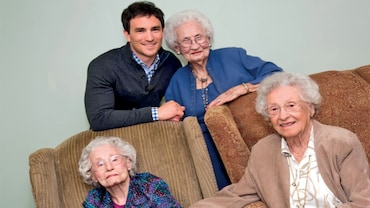- HOME
- /
- True Stories
- /
- Good News
- /
Good News: Social Media With A Heart, Banking On Green And Responsible Recycling
A viral video helps distressed owners of a roadside stall get back to business, a Kerala village rolls out a unique plan to support afforestation efforts and a 27-year-old man uses discarded single-use marks and PPE gears to make bricks
 Kanta Prasad and wife Badami Devi of 'Baba ka Dhaba'. Photo: Twitter/@sharpsightdelhi
Kanta Prasad and wife Badami Devi of 'Baba ka Dhaba'. Photo: Twitter/@sharpsightdelhi
Like thousands of small businesses around the country, ‘Baba Ka Dhaba’, a small roadside food joint in south Delhi’s Malviya Nagar faced dismal prospects ever since the coronavirus pandemic sent the nation into lockdown. But when a touching video of its octogenarian owners—Kanta Prasad and his wife Badami Devi—tearfully describing their struggle to make ends meet went viral in October, things turned around.
Viewed over 4.7 million times, the video sparked a massive campaign to offer Prasad financial aid as well as spread awareness about the need to support local vendors. Footfall improved dramatically, but the generosity did not stop there. Later that month, Dr Samir Sud—a family friend of the woman whose post about the dhaba first went viral—noticed from the video that Prasad and Badami Devi have cataracts and performed the necessary surgery for the condition without charge. While Prasad has since filed a complaint alleging misappropriation of the donated funds, his story is a telling reminder of how social media can be a powerful tool for good too.
Source: India Today, The Indian Express
***
As part of its continued efforts to be India’s first ‘carbon-neutral panchayat’, the Meenangadi village in Kerala’s Wayanad district has rolled out a unique way to support afforestation efforts—allowing farmers to mortgage trees on their land for interest-free bank loans. The project, devised by the state finance minister Dr T. M. Thomas Isaac, offers farmers financial incentive to plant and preserve forest cover by providing interest-free loans through local cooperative banks so recipients can care for the trees as well as meet other farm requirements.
From the state-allocated budget of Rs 10-crore, loans for 184 farmers have already been sanctioned in two wards of the panchayat, according to Beena Vijayan, who heads the local panchayat. Regular carbon audits monitor progress towards a carbon-neutral status, which will not only protect local biodiversity but also boost industries. If successful, the panchayat’s good work could lead the way to a cleaner, healthier environment and economy for other states as well.
Source: The Indian Express
***
Discarded PPE kits and single-use masks, which are non-biodegradable, have greatly exacerbated the already serious issue of plastic pollution around the world. But 27-year-old Binish ‘Recycle Man’ Desai, founder of Eco-Eclectic Technologies, Gujarat, had long anticipated this, based on the rising demand of protection equipment against COVID-19. Desai—known for designing the P-Block (recycled bricks made of industrial paper waste) in 2010—responded to this crisis with Brick 2.0, launched earlier this year.
 Binish Desai holding a Brick 2.0. Photo: Facebook/@binishdesai
Binish Desai holding a Brick 2.0. Photo: Facebook/@binishdesai
Made from discarded single-use masks and PPE gear, which are processed with “special binders” he has created in his personal lab, these bricks are said to be three times stronger than conventional ones at twice the size and half the price. They are also fire retardant, recyclable and absorb less than 10 per cent water. With innovations like this, the future of sustainable building and infrastructure looks brighter than ever before.
Source: The Hindu






